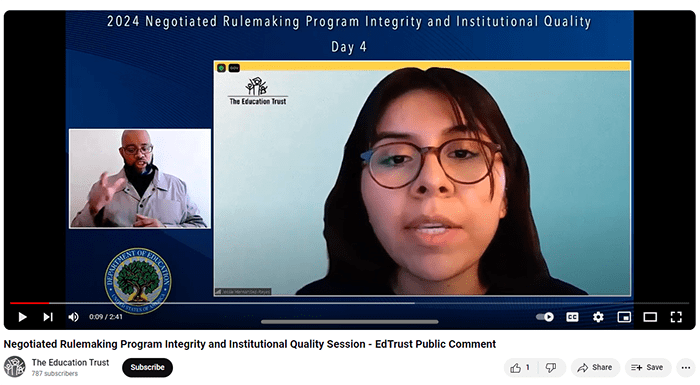Amid Disparities in College Outcomes, EdTrust Urges ED to fix the “Broken System”
I’m here to urge the Department to center the experiences and outcomes of students of color and students from low-income backgrounds throughout the rulemaking process.

Good afternoon,
My name is Jessie Hernandez-Reyes. I’m a senior policy analyst for higher education at The Education Trust. We work to dismantle racial and economic barriers in the U.S. education system, from preschool through college.
I’m also a first-generation college graduate and proud Mexican American.
I’m here to urge the Department to center the experiences and outcomes of students of color and students from low-income backgrounds throughout the rulemaking process.
This week, a diverse group of former students has shared how accredited colleges scammed them into spending down their federal student aid and GI Bill benefits while leaving them with no credential, or a worthless one.
The public deserves regulations that hold institutions and accreditors accountable and prevent them from harming students in the first place.
In addition, while students of color are nearly half of all undergraduates, accredited colleges often have persistently low college completion rates for these students. At collegeresults.org, we use federal data to shine a spotlight on some of these disparities, which are a sign of a broken system.
This lack of institutional effectiveness and accountability is a huge problem for the U.S. workforce. Fewer than 1/3 of Black adults and only 1/5 of Latino adults hold an associate degree or higher.
Federally recognized accreditors and colleges are responsible for student achievement and support, and they’re falling short. One reason is negative campus climate.
I spent a year talking to students of color at colleges around the country. Students recounted hostile treatment by peers and college staff, expressed a uncertainty about where and how to report incidents of discrimination, and shared feelings of isolation, stress, and exclusion due to these experiences. These stories confirm research on the importance of belonging for student success.
The Department should require accreditors to consider – for both institutional reviews against standards and ongoing risk assessment – retention and completion rates disaggregated by race or ethnicity and Pell Grant status; debt and repayment rates; processes for and outcomes of campus climate reviews; and Office of Civil Rights discrimination data.
Accreditors should also review retention and completion rates for incarcerated students attending higher education in prison programs and ensure incarcerated students are not duped into training for jobs they will not be eligible to take.
Lastly, the Department should ensure student complaints are not refused for being incorrectly or anonymously filed. Accreditors should err on the side of hearing students’ concerns and should adhere to swift timelines for addressing complaints.
Thank you.